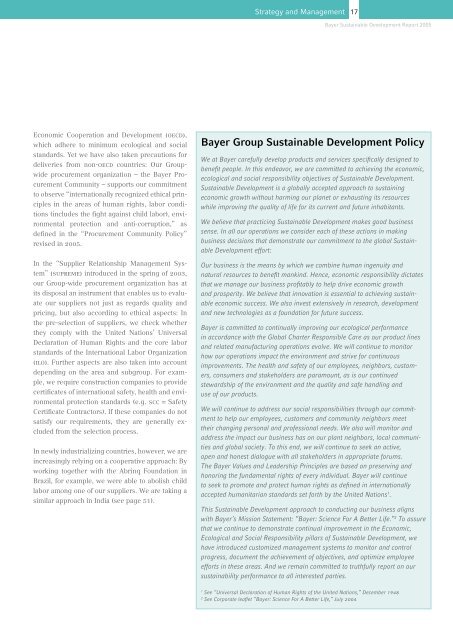Science For A Better Life - Bayer
Science For A Better Life - Bayer
Science For A Better Life - Bayer
You also want an ePaper? Increase the reach of your titles
YUMPU automatically turns print PDFs into web optimized ePapers that Google loves.
Economic Cooperation and Development (oecd),<br />
which adhere to minimum ecological and social<br />
standards. Yet we have also taken precautions for<br />
deliveries from non-oecd countries: Our Groupwide<br />
procurement organization – the <strong>Bayer</strong> Procurement<br />
Community – supports our commitment<br />
to observe “internationally recognized ethical principles<br />
in the areas of human rights, labor conditions<br />
(includes the fight against child labor), environmental<br />
protection and anti-corruption,” as<br />
defined in the “Procurement Community Policy”<br />
revised in 2005.<br />
In the “Supplier Relationship Management System”<br />
(supreme) introduced in the spring of 2003,<br />
our Group-wide procurement organization has at<br />
its disposal an instrument that enables us to evaluate<br />
our suppliers not just as regards quality and<br />
pricing, but also according to ethical aspects: In<br />
the pre-selection of suppliers, we check whether<br />
they comply with the United Nations’ Universal<br />
Declaration of Human Rights and the core labor<br />
standards of the International Labor Organization<br />
(ilo). Further aspects are also taken into account<br />
depending on the area and subgroup. <strong>For</strong> example,<br />
we require construction companies to provide<br />
certificates of international safety, health and environmental<br />
protection standards (e.g. scc = Safety<br />
Certificate Contractors). If these companies do not<br />
satisfy our requirements, they are generally excluded<br />
from the selection process.<br />
In newly industrializing countries, however, we are<br />
increasingly relying on a cooperative approach: By<br />
working together with the Abrinq Foundation in<br />
Brazil, for example, we were able to abolish child<br />
labor among one of our suppliers. We are taking a<br />
similar approach in India (see page 51).<br />
Strategy and Management<br />
17<br />
<strong>Bayer</strong> Sustainable Development Report 2005<br />
<strong>Bayer</strong> Group Sustainable Development Policy<br />
We at <strong>Bayer</strong> carefully develop products and services specifically designed to<br />
benefit people. In this endeavor, we are committed to achieving the economic,<br />
ecological and social responsibility objectives of Sustainable Development.<br />
Sustainable Development is a globally accepted approach to sustaining<br />
economic growth without harming our planet or exhausting its resources<br />
while improving the quality of life for its current and future inhabitants.<br />
We believe that practicing Sustainable Development makes good business<br />
sense. In all our operations we consider each of these actions in making<br />
business decisions that demonstrate our commitment to the global Sustainable<br />
Development effort:<br />
Our business is the means by which we combine human ingenuity and<br />
natural resources to benefit mankind. Hence, economic responsibility dictates<br />
that we manage our business profitably to help drive economic growth<br />
and prosperity. We believe that innovation is essential to achieving sustainable<br />
economic success. We also invest extensively in research, development<br />
and new technologies as a foundation for future success.<br />
<strong>Bayer</strong> is committed to continually improving our ecological performance<br />
in accordance with the Global Charter Responsible Care as our product lines<br />
and related manufacturing operations evolve. We will continue to monitor<br />
how our operations impact the environment and strive for continuous<br />
improvements. The health and safety of our employees, neighbors, customers,<br />
consumers and stakeholders are paramount, as is our continued<br />
stewardship of the environment and the quality and safe handling and<br />
use of our products.<br />
We will continue to address our social responsibilities through our commitment<br />
to help our employees, customers and community neighbors meet<br />
their changing personal and professional needs. We also will monitor and<br />
address the impact our business has on our plant neighbors, local communities<br />
and global society. To this end, we will continue to seek an active,<br />
open and honest dialogue with all stakeholders in appropriate forums.<br />
The <strong>Bayer</strong> Values and Leadership Principles are based on preserving and<br />
honoring the fundamental rights of every individual. <strong>Bayer</strong> will continue<br />
to seek to promote and protect human rights as defined in internationally<br />
accepted humanitarian standards set forth by the United Nations 1 .<br />
This Sustainable Development approach to conducting our business aligns<br />
with <strong>Bayer</strong>’s Mission Statement: “<strong>Bayer</strong>: <strong>Science</strong> <strong>For</strong> A <strong>Better</strong> <strong>Life</strong>.” 2 To assure<br />
that we continue to demonstrate continual improvement in the Economic,<br />
Ecological and Social Responsibility pillars of Sustainable Development, we<br />
have introduced customized management systems to monitor and control<br />
progress, document the achievement of objectives, and optimize employee<br />
efforts in these areas. And we remain committed to truthfully report on our<br />
sustainability performance to all interested parties.<br />
1 See “Universal Declaration of Human Rights of the United Nations,” December 1948<br />
2 See Corporate leaflet “<strong>Bayer</strong>: <strong>Science</strong> <strong>For</strong> A <strong>Better</strong> <strong>Life</strong>,” July 2004


